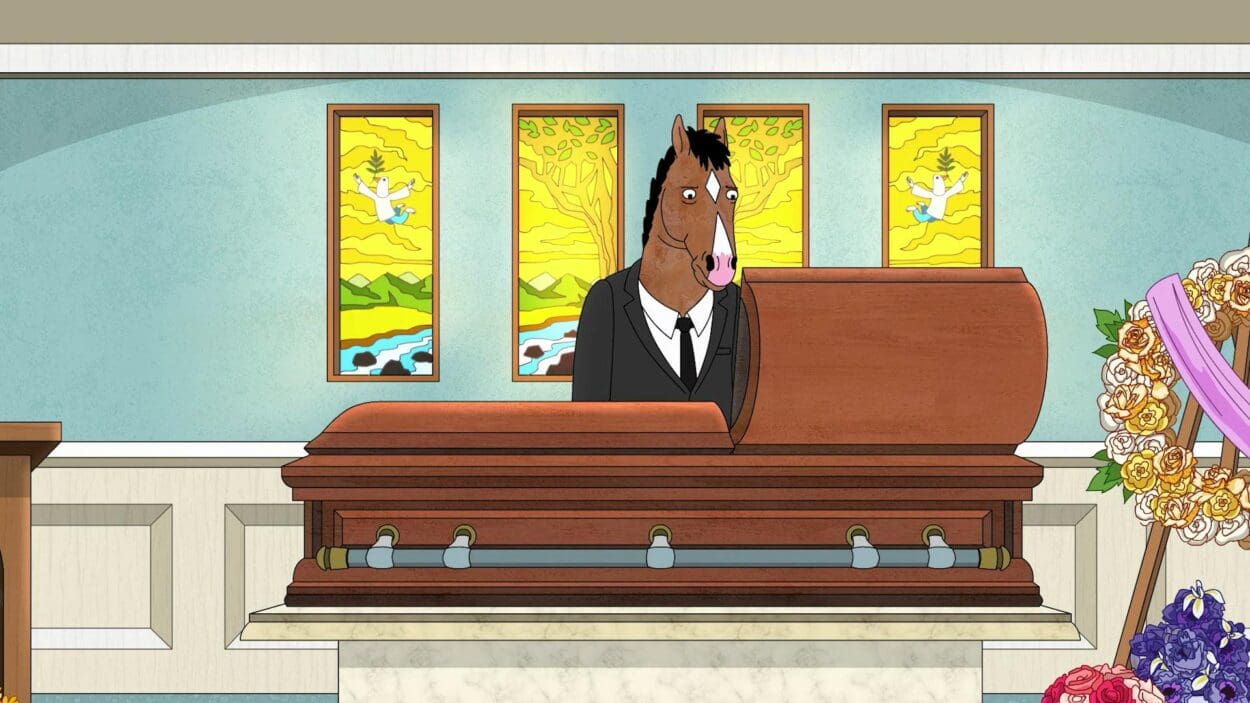Spoiler alert for BoJack Horseman Season 5.
For those of us who have had the pleasure (amidst the existential dread) of watching BoJack Horseman, we can attest to the standout episode that Free Churro is. At the halfway mark of season five, viewers are given an episode like none other before in the show: an entire episode consisting of one uninterrupted monologue from the main character, BoJack, in the form of a eulogy at his mother’s funeral. The eulogy isn’t the heartfelt one that would be expected at a wake for a deceased parent. It’s bitter, imbued with crass, tongue-in-cheek jokes. Just when you think BoJack is in the midst of recounting a touching moment shared between the two, he pops the audience’s optimistic bubble and delivers the hard truth of what their relationship was really like.
BoJack had a complicated relationship with his mother…to say the least. Pressured at an early age to perform for Hollywood execs, Beatrice Horseman was nary satisfied with her son’s lifestyle. As the show unravels the childhood trauma caused by his two parents, we only get insight into what made Beatrice the way she is quite late into the series…raised by an abusive father and lobotomized mother who pushed diet culture on her since she could barely tie her shoelaces, Beatrice learned that life is unforgiving and took every opportunity to pass this lesson on to BoJack, too.
However, between the insensitive zingers, BoJack reveals honest moments of hurt and disappointment in what could have otherwise been a loving and supportive relationship. Arguably the most heartbreaking part of the eulogy is the realization that his mother’s last words “I see you”, which he attempted to interpret throughout the eulogy, possibly as the one moment of acknowledgment and recognition for her son’s achievements, was most likely her reading aloud the “ICU” sign in the intensive care unit of the hospital.
Lessons About Grief We Can Take From “Free Churro”
Grieving a neglectful parent can leave you disappointed and resentful
Grief elicits a complicated array of emotions as is, but when you’re grieving a neglectful or abusive figure, there are extra layers of ambivalence, confusion, and resentment to unpack.
During one of those aforementioned moments of honesty, BoJack reveals the disappointment of what could have been:
“I kept waiting for that, the proof that even though my mother was a hard woman, deep down, she loved me and cared about me and wanted me to know that I made her life a little bit brighter. Even now, I find myself waiting. Hey mom, knock once if you love me and care about me and want me to know that I’ve made your life a little bit brighter.”
BoJack then goes on to cite another character, Diane’s, experience with grief earlier in the series. As the child of immigrants and the eldest (and only) daughter in the household, Diane struggled to connect with her father, who was frequently depicted as an angry alcoholic throughout past seasons. And yet, his passing deeply upset her:
“I knew it could be so much better, and now it never will be—and that’s what losing a parent is like.”
Even though your relationship may have been extremely complicated, there are still moments of pure grief for the good times
There was one moment during his mother’s eulogy that offered a glimpse into BoJack’s mother, Beatrice’s, graceful qualities that BoJack admired. He recounted the parties she would host at their childhood home, and how she always left space to put on her prettiest dress and perform a breathtaking dance.
“As a child who was completely terrified of both my parents, I was always aware that this moment of grace, it meant something.”
He finishes the colourful vignette of her performance with the following:
And for the first time in the entire eulogy, there is a real pause, where BoJack experiences an audio-visual flashback as his mother’s shadow dances in the background of his pained face…the only moment where he seems to experience pure sadness.
It’s hardly a novel thought to say that people are complex, but it’s worth pointing out that the image we paint of people who have hurt or disappointed us are often monolithic. No matter how complicated your relationship was, there will be moments of unadulterated sadness for the wonderful moments you shared.
Sharing your experiences with grief can be the ultimate form of catharsis
Like BoJack’s 25-minute-long eulogy unpacking his complex feelings about his mother’s passing or the many beautifully-written blog posts on this very website, Embrace Your Grief, sharing your experiences with loss can be extremely cathartic.
In BoJack’s case, the eulogy served as a rare moment of public vulnerability, exposing his innermost thoughts and emotions about his mother and their troubled relationship. This public airing of grief allowed him to confront his feelings in a way he might never have done privately. Similarly, when we share our stories of grief and loss, we not only honour our own experiences but also create a space for others to feel less alone in their sorrow. By voicing the complexities of our emotions, we can validate them.
Grief is universal, yet deeply personal in its manifestation. BoJack’s monologue reminds us that there is no right way to grieve and that it is okay to feel a myriad of conflicting emotions. Whether through writing, speaking, or other forms of expression, allowing ourselves to openly grieve can lead to a profound sense of relief and understanding. As we navigate our journeys of loss, we can find solace in the shared human experience of mourning.
Bob-Waksberg, Raphael (Creators) (2018). Free Churro. Retrieved from https://www.netflix.com | Image Source.








Leave a Comment